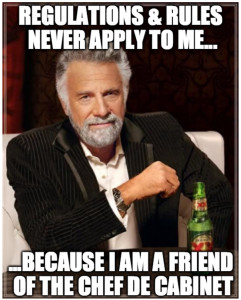When investigating any fraud, most investigators in the real world would probably agree that relying on the uncorroborated statement of someone who can reasonably be believed to be a co-conspirator is probably NOT the smartest thing to do.
I don’t believe anyone has ever conducted a survey, but my guess is that the General Assembly would not disagree.
The General Assembly may not be unanimous often, but almost all of the Member States have strong views on the subject of terrorism, and they are universally opposed to it.
So, when we have a fraud case that appears to be organised, co-ordinated and systematic, and it is taking place in a geographical area under the effective control of an organisation which many Member States consider to be a terrorist organisation, most investigators in the real world would probably agree that this could potentially be tied up with terrorist financing.
Oh dear….
But this is OIOS!
Now let us consider medical insurance fraud. The trick here is usually to claim for stress, whiplash or something else that is actually very difficult to disprove diagnostically.
Where a fraudulent claim is based on claims for expensive drugs, the investigator’s job is much easier, because there will be relevant medical evidence.
When investigating such a case, however, how am I – as an investigator – supposed to analyse that medical evidence? I am not a doctor. If I have a claim for a drug called Calcium Polycarbophil prescribed for a patient with being treated for migraines…… I can only nod my head sagely, but I am completely unqualified to comment on whether the dose should be 25mg or a tablespoonful three times a day. I need to ask a doctor if he thinks there is anything wrong with that. This is what investigators do….
There is something else too. If someone is being treated for a medical condition, one would normally expect to see accompanying claism for diagnostic tests. Doctors run tests, as anyone who has ever been ill will tell you – it’s what they do.
Imagine, therefore, that expensive medication is being prescribed for high levels of white blood cells. Blood cells cannot be counted by eye, this is something that one would expect to the result of a battery of medical tests….. So the absence of those tests would be suspicious…..
If the claim was fraudulent, the absence of claims for those tests would indicate that the doctor was party to the fraud, because if medications are being prescribed, and the claim was in fact fraudulent, the patient would need the co-operation of either the doctor who prescribed the medication, and/or the pharmacist who dispensed it…….
With me so far? You should not need a university degree in Applied Logic to follow this.
So what should the investigator do? Well, at this point in the planning stage, it would mean that the doctor and the pharmacist have to be considered potential co-conspirators in the fraud. That means that if the doctor said he prescribed three tablespoons of Calcium Polycarbophil, first thing in the morning because that was what the patient needed to treat his migraine – without taking the opinion of an independent doctor – that would not be very clever.
It is what, in legal parlance is called relying on the uncorroborated statement of a co-consiprator.
COMING SOON

